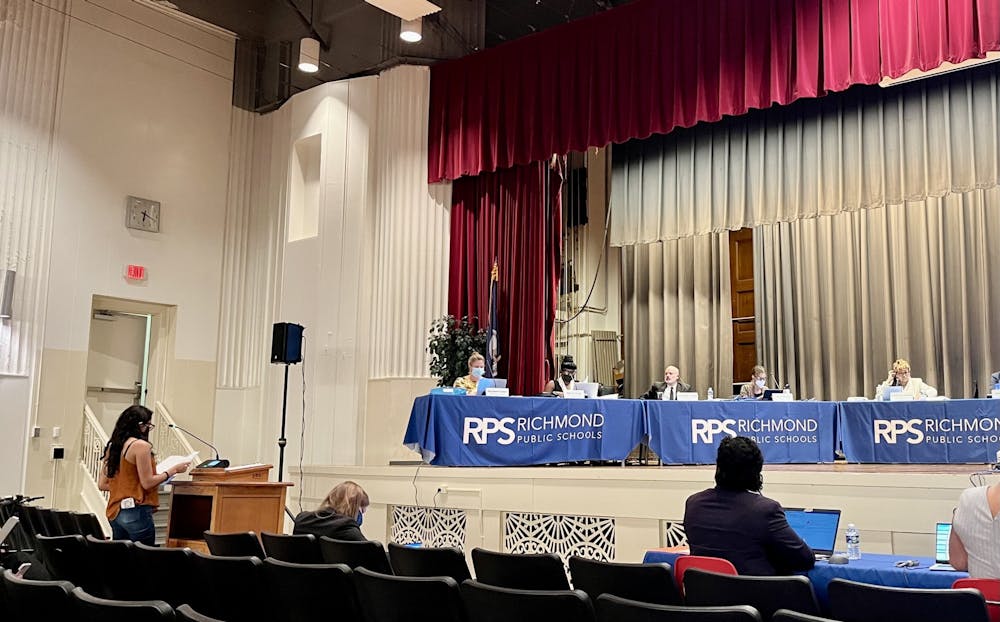The Richmond School Board unanimously passed a proposal at its last meeting to create a commission to improve the outcomes of Latinx students in response to allegations of mistreatment and low graduation rates.
Graduation rates of Latinx students are the lowest of any ethnic group in RPS, according to a letter to the school board from the Richmond branch of The League of United Latin American Citizens. In the class of 2021, 57% of Latinx students in Richmond graduated compared to 79% of all students, according to the letter.
Only a third of the Latinx students in the class of 2020 graduated on time, according to the LULAC letter. Recently released standardized test scores show Latinx students falling behind other ethnic groups, said Rachel Gómez, a member of LULAC’s education committee and a professor at Virginia Commonwealth University.
The pandemic resulted in learning loss for Latinx students, Gómez said. She gave the example of one Latinx student who was held back for two years in a row, putting him two years behind his peers.
“As long as we're able to predict educational outcomes by race and ethnicity and linguistics, then we are not done,” Gómez said.
The Latinx population within RPS has increased significantly in the last 15 years, said Thad Williamson, a University of Richmond professor and member of LULAC’s education committee. It has gone from a small portion of the student population to nearly 20%, he said.
“There's never been a Latino representative on the school board or any other elected body in Richmond, and so it's been hard for the community to get the sustained, top-level attention it deserves,” Williamson said.
In addition to the disparities in outcomes, there have been allegations of mistreatment of Latinx students by RPS, Gómez said.
“[Latinx students are] being forced into segregated classrooms where there are not enough chairs or desks for all the students, forcing many students to stand or sit on the floor during classroom instruction, which is unacceptable,” Gómez said.
Spanish-speaking families report being ignored by administrators and people working at front desks, Gómez said, even though translators were available.
In response to these disparities, LULAC proposed the formation of a commission to improve the status of Latinx students. The new commission, which the board committed to forming on Aug. 15, will listen to community testimony and gather data in the coming weeks to make recommendations on how the school board can better serve its Latinx students.
The only significant change to LULAC’s proposal for the commission was to change its structure from two co-chairs to four, Williamson said. These co-chairs will be two current school board members, Nicole Jones and Stephanie Rizzi, and two members of LULAC. The other members of the commission will be current and former RPS students, teachers, parents and other experts, Gómez said.
Enjoy what you're reading?
Signup for our newsletter
Vilma Seymour, the president of the Richmond chapter of LULAC, thanked the board for passing the proposal and urged members to implement it.
“The urgency is real,” she said in her testimony at the school board meeting. “I also ask you to consider this commission as a top priority and align yourselves with the immigrant, refugee and linguistically diverse communities.”
Williamson said the commission may recommend hiring more social workers and teachers, emphasizing bilingual education and developing new models of parent engagement.
The commission will also address the needs of English language learners. There is significant overlap between the Latinx and English language learning populations, Williamson said.
The commission will continue to use community feedback to drive its mission, and seek out the perspectives of those who might not typically speak at school board meetings, Gómez said. They are planning to host “Cafe-citos,” small gatherings to share experiences over coffee.
Contact city and state writer Kalina Kulig at kalina.kulig@richmond.edu.
Support independent student media
You can make a tax-deductible donation by clicking the button below, which takes you to our secure PayPal account. The page is set up to receive contributions in whatever amount you designate. We look forward to using the money we raise to further our mission of providing honest and accurate information to students, faculty, staff, alumni and others in the general public.
Donate Now



